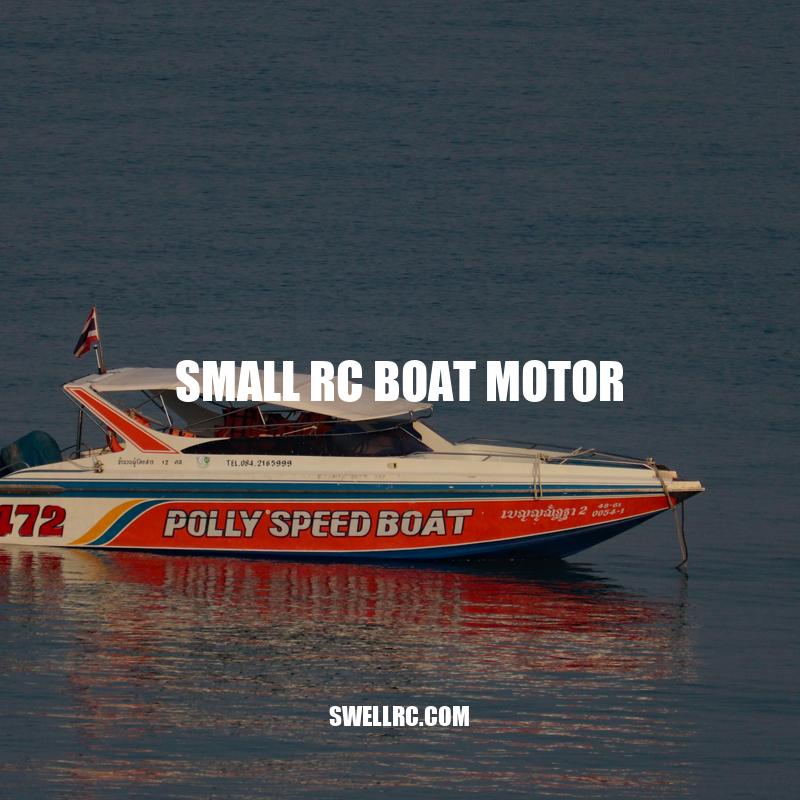Guide to Small RC Boat Motors: Choosing, Installing and Maintaining
Small RC boats are an enthralling hobby for all ages, allowing enthusiasts the chance to engage in water activities and enjoy the great outdoors. Apart from the excitement that one gets from operating these miniature vessels, they have opened opportunities for racing events contributing to the full-blown sport and enthusiast community. There are many factors determining an RC boat’s performance, but one of the most crucial is the motor. Selecting the correct size and type of motor is vital to ensure that the model operates smoothly and efficiently. This article will delve deeper into small RC boat motors by exploring the considerations that come into play when selecting one. We will share some of the essential tips you need to consider when choosing a small RC boat motor to enhance your boating experience. We will also discuss the maintenance, installation, and types of small RC boat motors. That way, you can make an informed decision that ensures your small RC boat can operate to its maximum capacity.
Basic Considerations when Choosing a Small RC Boat Motor
Choosing the right motor for an RC boat can ensure that the model operates as expected and experience desired performance. Here are some factors to consider when selecting a small RC boat motor:
- Motor size and type: Choose a motor that suits the size and type of your boat. Small boats will require small, lightweight motors, whereas large boats will need big, powerful motors to propel them.
- Power: Determine the type of performance you want from the boat and select an RC boat motor that delivers enough power to match your preference. The motor’s performance will affect the boat’s speed, maneuverability, and battery life.
- Battery Type: Ensure that the motor you choose is compatible with the battery type you use. You may have to acquire or upgrade a battery to match a motor’s power needs.
- Propeller size: Choose a propeller that has the correct size and material type for obtaining maximum boat speed and efficiency. You may have to experiment with different propeller sizes to find the best propeller for your motor and boat.
When you know how to select the right motor for your RC boat, you can enhance its performance, longevity, and enjoyment. For more detail on choosing the right motor, consider consulting specialist sites such as horizonhobby.com/products/marine/electric-motors or rcboatmag.com/motors-and-electronics. Additionally, you may also consider purchasing high-quality small RC boat motors from reputable brands such as Traxxas, Aquacraft, or Venom.
How do I choose a RC boat motor?
When choosing a RC boat motor, consider the following factors:
- Type of boat: Different types of RC boats require different motors. For example, a large scale boat may need a more powerful motor than a small boat.
- Power: Look at the power rating of the motor. Higher power means faster speeds and larger boats.
- Weight: Consider the weight of the motor in relation to the weight of your boat. A heavy motor may not be suitable for a lightweight boat.
- Battery: Choose a motor that is compatible with the battery you plan on using.
- Brand: Look for a reliable and reputable brand for the best quality and performance.
Some websites that offer a variety of RC boat motors to choose from include Tower Hobbies, Amazon, and HobbyKing. Be sure to research and compare different products before making a final decision.
| Factors | Considerations |
|---|---|
| Type of boat | Different types of boats require different motors |
| Power | Look for higher power ratings for faster speeds and larger boats |
| Weight | Consider the weight of the motor in relation to the boat |
| Battery | Choose a motor that is compatible with your battery |
| Brand | Look for reliable and reputable brands for better quality and performance |
Check websites like Tower Hobbies, Amazon, and HobbyKing for a wide selection of RC boat motors to choose from. Make sure to compare and research before making your final purchase.
Types of Small RC Boat Motors
There are different types of small RC boat motors to choose from depending on your style of boating, budget and performance needs. Here are some of the most common types of small RC boat motors:
- Brushed Motors: This type of motor is the most affordable and commonly found motor among small RC boats. They use permanent magnets, brushed commutation and are easy to operate. Brushed motors have less power and low efficiency compared to brushless motors.
- Brushless Motors: These motors offer more power, efficiency and speed than brushed motors. They have no brushes, enabling less friction and wear and tear. Brushless motors also require less maintenance.
- Inrunner Motors: These motors have the advantage of being compact and lightweight. They offer high RPM rates at lower voltages making them an ideal choice for smaller boats or stealthy boat designs that need to be more maneuverable.
- Outrunner Motors: These motors offer more torque, making them an excellent choice for heavy boats. They are also quieter and provide a smoother operation, making them a popular selection for larger boats.
The table below shows some pros and cons of Brushed vs. Brushless Motors.
| Brushed Motors | Brushless Motors |
|---|---|
| Affordable | Expensive |
| Less efficient and offer less power | More efficient and deliver more power |
| Requires frequent maintenance | Low maintenance, making it a more long-term investment |
For more in-depth knowledge about types of small RC boat motors, you can read informative articles from specialist sites such as Horizon Hobby or check out products from reliable brands like Traxxas and Pro Boat.
What motors are used in RC boats?
RC boats use different types of motors including DC, AC, and brushless motors. The most commonly used motor type is the electric brushless motor due to its high power and speed.
Here are some popular motor options for RC boats:
- Traxxas Velineon Brushless Power System
- AquaCraft Bristol Trawler Motor
- Atomik Water-Cooled Brushless ESC Motor
- Mabuchi 540 Brushed Motor
More information on RC boat motors and products can be found on websites such as Horizon Hobby and RC Planet.
Installation and Maintenance of Small RC Boat Motors
Proper installation and maintenance of your small RC boat motor can optimize its performance and prolong its lifespan. Consider the following tips when installing and maintaining your motor:
- Ensure the motor is compatible with your boat’s design and size
- Make sure the motor is installed correctly and securely
- Use the appropriate lubricants and cleaners when necessary
- Check the motor for loose connections, corrosion, and other signs of damage
- Clean the motor after every use, and store the motor dry and properly
- Replace worn-out parts promptly to avoid further damage to your motor
Products such as small RC boat motor maintenance kits are available in the market for routine maintenance and repair of small RC boat motors. Some useful sources for tips and guidance on maintaining your small RC boat motor can be found on websites such as RC Boat Magazine.
How do you maintain a boat motor?
To maintain a boat motor properly, follow these steps:
- Flush the engine after each use with fresh water to remove salt buildup.
- Change the oil and oil filter regularly, following the manufacturer’s recommendations.
- Inspect and replace the fuel filter as needed.
- Check and replace spark plugs and wires according to the manufacturer’s schedule.
- Grease the fittings and moving parts to prevent corrosion and rust.
- Store the motor in a dry, covered area to protect it from the weather.
For more detailed information, some helpful resources include:
- The website for your motor’s manufacturer may have specific guidelines and recommendations for maintenance.
- The book “Boatowner’s Mechanical and Electrical Manual” by Nigel Calder provides detailed information on boat maintenance, including the motor.
- Products like Quickleen by Mercury Marine or Xtreme Clean by Forespar can be used to clean and maintain the engine and fuel system.
| Maintenance Task | Frequency | Notes |
|---|---|---|
| Flush with fresh water | After every use | – |
| Change oil and filter | As recommended by manufacturer | Use the appropriate type of oil for your engine |
| Inspect/replace fuel filter | As needed | Check for clogs or damage |
| Check/replace spark plugs and wires | As recommended by manufacturer | Replace if corroded or damaged |
| Grease fittings and moving parts | As recommended by manufacturer | Prevents rust and corrosion |
| Store in dry, covered area | When not in use | Protects motor from weather damage |
General Troubleshooting for Small RC Boat Motors
Despite proper maintenance, small RC boat motors may encounter issues during operation. Here are some tips to diagnose and fix common motor problems:
- Check the battery: Make sure your battery is providing sufficient power and has a full charge. If not, recharge or replace it as required.
- Inspect the propeller: Make sure the propeller is not obstructed by debris or damaged. Replace the propeller if necessary.
- Check the connections: Ensure all connections between the motor, battery, and controller are secure and not loose or damaged. Tighten or replace as required.
- Inspect the motor: Look for any signs of damage or corrosion on the motor itself. Clean or replace the motor if necessary.
- Adjust the trim: Adjusting the trim can help optimize the boat’s handling and speed.
- Check the controller: Ensure the controller is functioning correctly and calibrated to the motor and boat settings.
If you encounter persistent or more complex issues with your small RC boat motor, consider seeking the advice of experienced RC boat enthusiasts or professionals. Websites such as RCGroups can provide helpful tips and forums to connect with experienced boat hobbyists. Additionally, products such as Acetech motor tester can assist in diagnosing motor problems and providing guidance for repair.
How does a RC boat motor work?
An RC boat motor works through a combination of electrical power and mechanical components. The electricity from a battery is sent to the motor, which transforms it into mechanical energy to drive the propeller or impeller that moves the boat through water.
Some common types of RC boat motors include brushed, brushless, and nitro-powered. Each of these motors operates differently and has its own advantages and disadvantages.
Brushed motors are the most basic type and are ideal for beginners or those on a budget. Brushless motors are more advanced and powerful but also more expensive. Nitro-powered motors use a fuel mixture to create power and are known for their speed but can be complicated to maintain.
To learn more about RC boat motors and their components, you can visit websites such as RC Planet and Horizon Hobby, which offer a wide range of RC boat products and information.
Conclusion
Choosing the right small RC boat motor can significantly affect your boat’s performance, speed, and maneuverability. Consider your boat’s model, size, and intended use when selecting the appropriate motor, as well as factors such as motor type and propeller choice. Additionally, proper maintenance and troubleshooting can ensure your motor operates optimally and prolong its lifespan.
Investing in a quality small RC boat motor and taking the time to properly maintain it can greatly enhance your RC boating experience. Whether you’re a seasoned enthusiast or new to the hobby, keeping these considerations in mind can help you choose and maintain a reliable and high-performing motor for your RC boat. With the right motor and maintenance, you can enjoy many successful and thrilling runs on the water.



